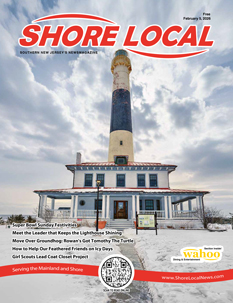By John Gibbons
It was mid-September 1984 and Hammonton was buzzing. President Ronald Reagan was coming to town. The incumbent was making a campaign speech in a race against Democrat and former vice president, Walter Mondale.
The town had gone all out for Reagan’s visit. Patriotic bunting decorated the buildings and a local band with cheerleaders was in place on the outdoor stage. A giant American flag filled a large wall behind where Reagan would speak. A banner read: “America: Prouder, Stronger & Better.” A crowd of more than 30,000 had come out in Hammonton to hear Reagan, many of them waving hand-held American flags.
Ronald Reagan generally had optimistic and upbeat things to say in his speeches, and his remarks in Hammonton that day were no different. This time, however, in part of his speech, he mentioned a popular rock ‘n’ roll singer known to many in New Jersey and elsewhere.
“America’s future rests in a thousand dreams inside your hearts,” President Reagan said in his speech. “It rests in the message of hope in songs so many young Americans admire: New Jersey’s own Bruce Springsteen. And helping you make those dreams come true is what this job of mine is all about.”
Bruce Springsteen at the time was about as popular as a rock ‘n’ roll singer could be, and it certainly couldn’t hurt a politician to be identified with that kind of popularity. Springsteen had a very successful album, “Born in the U.S.A.”, with a popular song of the same name. The album had been released in June 1984 and was No.1 on the Billboard album chart by July, remaining on the chart for 139 weeks. It would also spawn seven Top-10 hit singles and become one of the best-selling albums of all time over 15 million copies sold in the U.S. It was a monster hit, as was its title song, “Born in the U.S.A.” Springsteen and his band were touring the country with their concerts selling out stadiums.
President Reagan’s 1984 reelection campaign was in full stride at the time. George Will, a conservative Republican and columnist for The Washington Post had attended one of Springsteen’s Washington DC performances at the invitation of Springsteen’s drummer, Max Weinberg and his wife Rebecca. In Will’s column, which ran in many papers across the country, he praised Springsteen as an exemplar of classic American values. Will wrote: “I have not got a clue about Springsteen’s politics, if any, but flags get waved at his concerts while he sings songs about hard times. He is no whiner, and the recitation of closed factories and other problems always seems punctuated by a grand, cheerful affirmation: ‘Born in the U.S.A.!’” George Will had some friends and connections in the Reagan White House. He thought that Springsteen might endorse Reagan (not knowing that Springsteen was very much a liberal and thus did not support Reagan at all), and got the notion pushed up to high-level Reagan advisors. Those staffers made inquiries to Springsteen’s management which were politely rebuffed.
Reagan and his speechwriters nonetheless went for the connection, which accounted for Reagan’s remarks about Springsteen in Hammonton. The national press, meanwhile, after hearing Reagan’s mention of Springsteen at Hammonton, doubted that Reagan knew anything about Springsteen or his music. Some asked what Reagan’s favorite Springsteen song was, for example. After a time, came the answer: “Born to Run.”
Meanwhile, Democratic presidential challenger Walter Mondale would say sometime later while campaigning, “Bruce Springsteen may have been born to run but he wasn’t born yesterday,” referring to Reagan’s use of the Springsteen association. Mondale later claimed to have been endorsed by Springsteen. But Mondale, too, was off the mark. Springsteen manager, Jon Landau, denied any such endorsement, and the Mondale campaign issued a retraction.
Springsteen, in an interview with Rolling Stone magazine, had a bit more to say about Reagan:
“I think people have a need to feel good about the country they live in. But what’s happening, I think, is that that need– which is a good thing– is getting manipulated and exploited. You see it in the Reagan election ads on TV, you know, ‘It’s morning in America,’ and you say, ‘Well, it’s not morning in Pittsburgh.’”
George Will and Reagan’s speechwriters had misinterpreted or ignored Springsteen’s true message. Sure, they wanted to capture the energy of the song and its rousing chorus for flag-waving concert for America but a closer examination sees something different. His songs often described a broken system and the struggles of the working-class. “Born in the U.S.A,” was about a local guy who goes off to fight in Vietnam, and returns to find no job, no hope, and no respect.
Ronald Reagan, in any case, was reelected in 1984, as the Reagan-Bush ticket soundly beat Walter Mondale and running mate Geraldine Ferraro. Springsteen, meanwhile, was in the midst of one of his most popular periods, having continued success in performing and songwriting. Ronald Reagan, however, would not be the only politician to try to associate with Springsteen’s music. In 1996, U.S. Senator Bob Dole, then running for president against Bill Clinton, briefly used “Born in The U.S.A.” in his campaign a few times until Springsteen objected.












